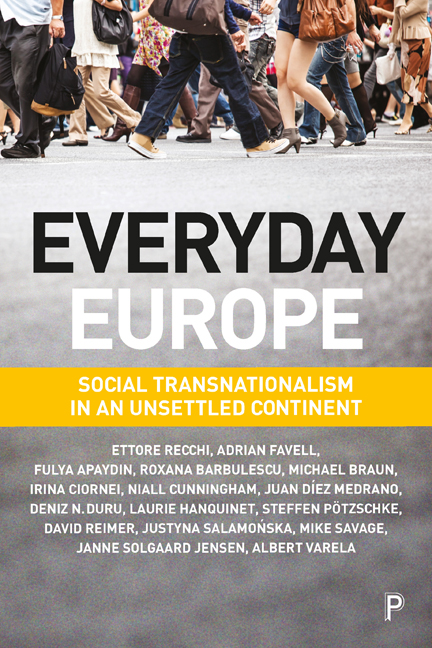Book contents
- Frontmatter
- Contents
- List of tables and figures
- Notes on contributors
- Acknowledgements
- Introduction: Social transnationalism in an unsettled continent
- one Cartographies of social transnationalism
- two The social structure of transnational practices
- three Cultural boundaries and transnational consumption patterns
- four Social transnationalism and supranational identifications
- five Explaining supranational solidarity
- six Narratives and varieties of everyday transnationalism
- seven Understanding Romanians’ cross-border mobility in Europe: movers, stayers and returnees
- eight Transnational Turkey: the everyday transnationalism and diversity of Turkish populations in Europe
- Epilogue Is social transnationalism fusing European societies into one?
- Methodological appendix
- Index
eight - Transnational Turkey: the everyday transnationalism and diversity of Turkish populations in Europe
Published online by Cambridge University Press: 19 April 2022
- Frontmatter
- Contents
- List of tables and figures
- Notes on contributors
- Acknowledgements
- Introduction: Social transnationalism in an unsettled continent
- one Cartographies of social transnationalism
- two The social structure of transnational practices
- three Cultural boundaries and transnational consumption patterns
- four Social transnationalism and supranational identifications
- five Explaining supranational solidarity
- six Narratives and varieties of everyday transnationalism
- seven Understanding Romanians’ cross-border mobility in Europe: movers, stayers and returnees
- eight Transnational Turkey: the everyday transnationalism and diversity of Turkish populations in Europe
- Epilogue Is social transnationalism fusing European societies into one?
- Methodological appendix
- Index
Summary
Introduction
Turkish-origin populations are recognised as the largest non-national group resident across Europe (EUROSTAT 2015), and their highly transnational profile is well known (Küçükcan and Güngör 2009; Abadan-Unat 2011). The transnationalism of Turkish, Kurdish and other Turkish-origin migrants living in Europe has mostly been explored through their sense of belonging: for example, in studies of locality, town, country of residence and/or origin, and its relation to ideas of Europe, homeland or world citizenship; or in terms of daily interactions with the locals/natives, and the multiple, sometimes contradictory, identifications to which this leads – Turco-German, cosmopolitan, European, Turkish nationalist, Alevi, Kurdish exile, and so on (see Geaves 2003; Kaya 2007; Mandel 2008; Toktas 2012; Fokkema et al 2017; Cesur et al 2018). Yet, despite an ever growing literature, there is little work detailing their physical and virtual transnationalism on a broader and comparative scale, as has been possible using data from the EUCROSS survey (see Pötzschke et al 2014; Pötzschke 2015).
With the dataset available to us, this chapter focuses on the transnational practices of Turkish and Kurdish migrants living in Denmark, Germany, Italy, Romania and the UK, adopting a mixed-methods research design, enabled by a combination of work completed (a quantitative survey of 250 Turkish nationals and 10 in-depth interviews in each of the five countries, leaving aside Spain which only has a very small Turkish-origin population). Our goal is initially descriptive and cartographic, in line with other chapters: to offer a broad and detailed view of the population which captures the variety and internal cleavages within this particular case of European social transnationalism. In turn, though, such a view provides insight into the intimacy and difficulty with which Turkey is socially and politically integrated into Europe, as well as its broader geopolitical positioning.
After a literature review on the study of Turkey in Europe and a discussion of the wider research questions raised by the case of Turkish transnationalism, we organise our analysis in three main sections. In a first section, we document the demographics of the Turkish sample across the five nations in Europe, and the basic cross-border mobilities of this population in terms of their physical and virtual mobility.
- Type
- Chapter
- Information
- Everyday EuropeSocial Transnationalism in an Unsettled Continent, pp. 225 - 254Publisher: Bristol University PressPrint publication year: 2019



